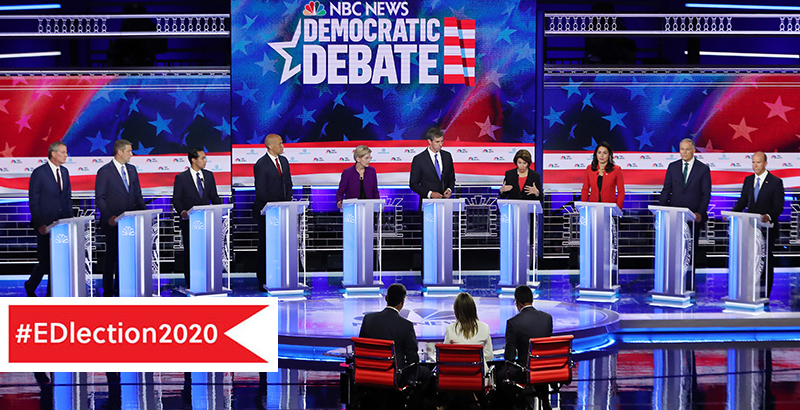Williams: The 2019 Democratic Debates, Where No One Argues for Fixing America With Better Schools

In the current issue of The Atlantic, progressive entrepreneur Nick Hanauer published a provocative article under the headline “Better Schools Won’t Fix America.” Predictably, the piece reinflamed the left’s long-festering intramural education fights. Reformers fumed. Their critics cheered. Barack Obama praised the piece on Twitter.
The piece’s core thesis orbited a neologism: “educationism.” As Hanauer put it, “The longer we pretend that education is the answer to economic inequality, the harder it will be to escape our new Gilded Age … But instead of focusing on ways to increase household income, educationists in both political parties talk about extending ladders of opportunity to poor children.”
While this stance — school reform can solve poverty on its own — is recognizably standard conservative fare, it’s less clear that many progressives view the world that way. Have they also been pretending that education is the key to solving inequality? After all, if Barack Obama governed as an education reformer intent on improving schools, he also expanded access to health care, pushed for a more progressive tax code and called combating income inequality and social immobility “the defining challenge of our time.” (Hanauer has also written about Obama on inequality, incidentally.)
So … where are these hard-nosed progressive educationists hiding? Fortunately, the Democratic Party just held its first debates of the presidential primary season this week — so we can check. Oddly enough, even though 20 candidates spoke during the two-night event, there was little evidence of the sway of “educationism” on those stages. Candidate after candidate flagged the dangers that inequality poses to American democracy.
Former representative John Delaney (D-MD) warned that “we’ve got to fix our public education system, [because] it’s not delivering the results our kids need.” Sounds like an educationist! Except, wait, that line came after Delaney called for raising the minimum wage, establishing paid family leave and doubling the earned income tax credit. And Rep. Tim Ryan (D-OH) called for “trauma-based care in every school.” Former vice president Joe Biden flogged his proposal to triple Title I spending (the federal government’s core K-12 funding program for low-income students).
Hmm. Well, noted education reformer Sen. Cory Booker (D-NJ) was asked about health care and instantly pivoted: “We’re talking about this as a health care issue, but in communities like mine, low-income communities, it’s an education issue.” That sure sounds like the educationist reduction move! So you’re saying that we can’t address health care issues without blaming them on schools, eh, Senator? Except Booker continued: “because kids who don’t have health care are not going to succeed in school.”
Senator Amy Klobuchar (D-MN) insisted that “economic opportunity” required the country to have “schools that work.” Again: gotcha, educationist! Except, again, that only came after she said it required “better child care for everyone in this country. And when you want an economy that works, you need to have retirement that works.”
And, well, that’s about all. Aside from some jockeying over how to address student loan debt and abstract promises to expand access to affordable early education programs, education remained an afterthought.
It’s almost as if, well, basically no major progressive figure (and no minor progressive figure, given the flock of candidates) believes in anything that sounds even vaguely like Hanauer’s educationism. It’s almost as if the doctrine of schools-only solutions to poverty and inequality isn’t a serious, let alone hegemonic, position for progressives. Precisely zero of the current Democratic candidates for that party’s presidential nomination believe that public education is the primary cause of American inequality.
Indeed, in his piece, Hanauer recommends we pay workers better and “invest not only in our children, but in their families and their communities. We must provide high-quality public education, sure, but also high-quality housing, health care, child care, and all the other prerequisites of a secure middle-class life.”
Right. But, again, that sure sounds a lot like, well, every single candidate running for the Democratic Party nomination. It sounds a lot like the last Democratic presidential administration. And none of those things are incompatible with reform policies to make U.S. schools more equitable and higher performing — things like fair school funding, stronger academic standards, regular assessments, transparent data reporting and meaningful public accountability.
As I put it on Twitter when Hanauer’s piece came out:
https://twitter.com/ConorPWilliams/status/1138522710437486592
https://twitter.com/ConorPWilliams/status/1138523368364396546
Sure, Hanauer’s article blames wealthy philanthropy — not just the Democratic Party — for advancing the notion that school reform can solve inequality and social immobility. But that “rich people misunderstand inequality as a matter of economics and politics” isn’t a particularly interesting or counterintuitive take. It’s like noting that water is wet or Ryan Gosling is handsome.
Most of the folks focused on improving American educational equity already know that. That’s why they’ve — we’ve — gotten so fired up about the ways that schools customarily allow the wealthy to launder their economic privileges into opportunity hoarding, usually through the real estate market. So look, “Better Public Schools Are Part of a Meaningful Strategy to Combat Inequality in America” may not be as catchy a headline, but that doesn’t make it wrong.
*The views presented here are Conor P. Williams’s alone and do not imply the endorsement of any organization with which he is affiliated.
Get stories like these delivered straight to your inbox. Sign up for The 74 Newsletter

;)
